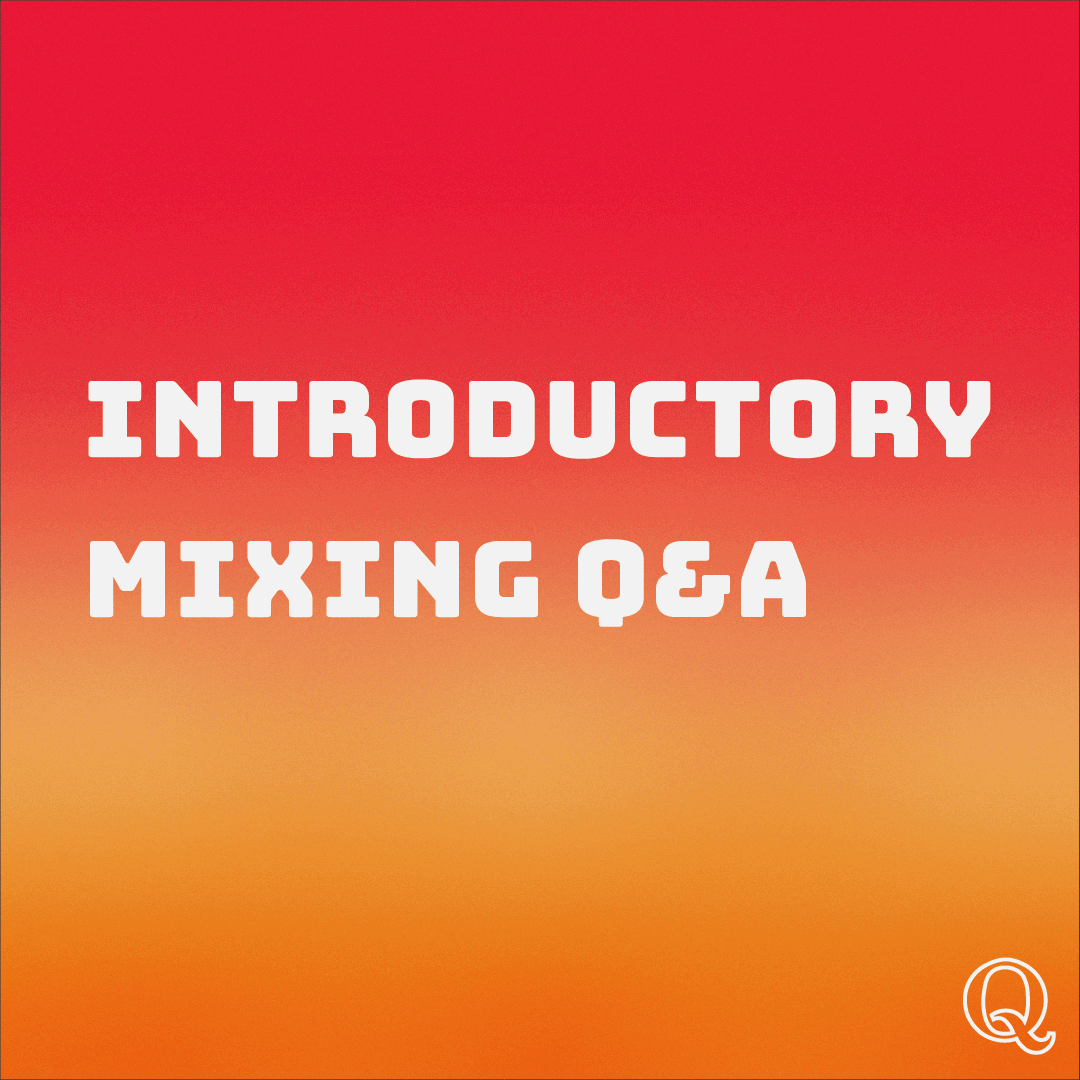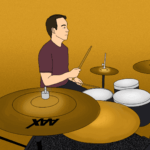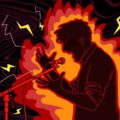The mix of a song can make or break the final product.
Making sure that all the sonic elements of a beat or track are intertwined to create a professional-sounding result is an art form in itself and requires continuous ear training and critical listening skills. The key to getting good at mixing is practice and patience.
However, it can be difficult to learn without proper guidance and overwhelming when you don’t know where to begin. To help you get started on your mixing journey, we’ve sourced and answered some of the most frequently asked introductory mixing questions from Quora.
What exactly do mix engineers do, and why are they necessary for a song or album?
Bringing harmony to your track
The mixing engineer is the person who works on bringing balance and coherence to all the tracks recorded in a project by mixing them down into a single stereo track.
In the digital era, it is not uncommon to have 8-16 tracks allocated to drums, then another 4-8 for guitars, and 10-20 for all the vocal tracks. So, the mixing engineer is crucial to making sure all these sounds can be heard, serve their purpose, and fall into place during playback of the song or project.
Understanding the gear
The mixing engineer brings knowledge of audio processors, acoustics, phase relationships, DAW operations, and, most importantly, their critical ear. This knowledge and skillset take years to develop. Having an engineer work on an entire album will ensure you have consistency across every song.
Glossary
Stereo track: refers to two directions, usually right and left. The sound is split into two signals instead of coming from one source, which would be mono
Audio processing: electronic manipulation of audio signals
Acoustics: the properties or qualities of a room
Phase: the result of combining two or more identical signals of the same source (E.g.: 2 microphones on an acoustic guitar. The time difference between the two microphones causes phasing, where some frequencies will either be cancelled or boosted.)
DAW: stands for Digital Audio Workstation. This is the software used for recording, editing and producing audio. Pro Tools, Ableton, Logic are all examples of DAWs.
What is the difference between sound design, sound mixing, sound engineering, and sound editing?
Sound design
Sound design is the process of creating a new sound from scratch. In film production, sound design is the process of creating sound elements that aren’t available on set (think of Godzilla’s roar). However, sound design can also be found in electronic music, where using signal generators to create a drum kit from scratch is also considered sound design.
Sound mixing
Sound mixing is the job of the mixing engineer, where he works on bringing balance and coherence to all recorded tracks by mixing them down into a single mono, stereo or surround track. The mixing engineer brings knowledge of audio processors, acoustics, phase relationships, DAW operations, and, most importantly, their critical ear.
Sound engineering
Sound engineering is a general term that’s used to define the work done by audio engineers or sound engineers.
Sound editing
Sound editing is the process of cleaning up audio by removing unwanted noises, ensuring everything is in sync and phase-aligned, restoring audio that’s damaged, and adding fades to clips to ensure there are no pops/clicks.
Glossary
Signal generators: generate electronic signals with set properties of amplitude, frequency, and wave shape
Fade: gradual increase or decrease in sound level (or from/into silence, as you might hear at the beginning or end of a track)
Pops/clicks: an unwanted and abrupt change in the way the waveform moves up or down
What are some essential mixing tips every beginner should know?
Assuming you already know the basics of mixing (processors, phase, DAW operations, acoustics, and other standards), start with the listening environment; if a studio isn’t moderately balanced, the mixes will have mixed results.
Establish your listening level and manage ear fatigue
Set a fixed volume on the speakers, whether that’s 85dBs, 75dBs or whatever feels comfortable for mixing. Having a consistent listening level helps keep elements in perspective. Keep in mind that mixing at louder volumes will increase ear fatigue. For this reason, you need to take breaks every hour at a minimum.
Before starting a mix, understanding the client is a must. If it’s a punk rock, metal, jazz, R&B or trap artist, spend time listening to that genre of music. Try and focus on each element of the mix; how the songs are panned, how the track sounds frequency-wise, volume-wise, and spatially. Understand the genre.
That being said, have a reference track to A/B (compare) the mix with. This will expose all the flaws in the mix. Using a frequency analyzer can help visually show how balanced the reference track is in comparison. Remember, it’s just another tool, don’t rely on it 100% of the time.
Critical listening and using processors effectively
Keep in mind that every recording is different, and no two engineers will have the same starting point. Consequently, presets may not always work since EQs may need to be boosted differently, compression may need to be applied a little more or less, etc. Knowing when and how much of each processor to use and in which order comes with experience.
When starting out, it can be helpful to join as many mixing or remixing competitions as possible to hear how your mixes compare to other engineers.
Glossary
EQ: stands for equalization. The process of levelling a frequency (or group of frequencies) within a sound to rid a track of imperfections
Compression: the process of reducing a signal’s dynamic range (the difference between the loudest and quietest parts of an audio signal)
Panning: the distribution of a sound signal (can be used to make something sound like it’s moving from left to right in your speakers, or used to create vocal doubling effects, etc.)
Frequency analyzer: a tool that measures the phasing extent of a frequency signal within the instrument’s bandwidth
What is the easiest program for beginners to practice mixing? Which DAW do you recommend?
The fundamental engine behind every DAW is the same. If you can learn the engine behind one DAW, you can apply the same concepts to the other ones.
It depends on your situation
If you’re just getting into mixing, then we suggest looking at free DAWs like Pro Tools First or Reaper.
If you’re more into music composition, then we suggest looking at Logic Pro X or Reason.
Choosing a DAW is really a personal choice. You might like Cubase, though everyone tells you to use Ableton. Most of these software companies offer a 1-month free trial or an intro version of their pro software at a lower price. We suggest starting there and choosing the one that works best for you.
Otherwise, in terms of mixing, Pro Tools is the industry standard.
I’ve been learning how to mix music for several months, but I’m still struggling. What are the basic principles of mixing music, and how can I improve in a short time?
Mixing is a skill that takes years to master just the basics. This isn’t something that you can rush through in a short period of time. It honestly takes thousands of hours of pure dedication and ear training to master.
Knowing the basics means you need to understand
- Audio processors (equalizers, compressors, limiters, time-based effects and their effect on waveforms)
- Acoustics (how sound works, how your hearing works, acoustic properties of instruments/rooms, waveforms, phase is a big one, etc.)
- DAW operations (routing, audio formats/codecs, latency, etc.)
- Industry standards for publishing (mastering for streaming, etc.)
The above doesn’t even cover 20% of the basics. At the end of the day, you still need to spend thousands of hours training your ears to identify if something is in phase, out of phase, flanging, how an EQ is affecting other sounds, and so on.
Taking a program that teaches audio production is a good way to learn the basics, but again you still need to spend the additional time training your ears and developing your skills. Patience is the name of the game.
Glossary
Flanging: an audio effect that mixes two identical audio signals together, then delays one of them by a small or gradual amount.
How can I make my mix sound fuller and more vibrant? It sounds good right now, but I can’t seem to bring it to the next level.
Identify what your track is missing
There are 101 things you can do to make a track better. Start by identifying what it is specifically that doesn’t sound right or that is missing. A/B your track with a reference track.
You can make a track sound fuller by tweaking your EQ and compression settings. To add some vibrance, play around with time-based effects, distortion plugins, automation, etc.
It can also be the type of EQ or compressors you’re using that aren’t serving the track. Try using dynamic EQ or multiband compressors as opposed to standard EQ and compressors.
Glossary
Distortion: an audio signal processing effect, usually used to add fuzz or grit to a sound
Automation: creating changes over time to volume, pan, and other settings
Dynamic EQ: a tool that combines equalization and compression
Multiband compressor: a tool that splits the frequency spectrum into separate bands, each with different compression settings
What’s the easiest way to push a track back into the mix?
Adjusting your equalization and the volume of the source can help pull it back in the mix. The use of time-based effects, like reverb, can also help bring a source back in the mix, as you’re creating a spatial environment for the track.
Glossary
Reverb: is an effect that uses echo and the reflection of sound waves to create a floatier and spacier sound
I’m mixing a song where the same instruments were recorded in various takes, but were positioned differently from the mic in each take. What is the easiest way to correct that to have the same panning?
If the mics were moved into a new position with each take, take the best take and trash the rest. Because they were moved, you will end up with an inconsistent sound for the instrument.
Trying to use the multiple takes can also cause issues with phasing, so in this case, keep what you need and drop the rest.
How much should I pay to have my song mixed?
The rate for mixing a song varies based on the level of the engineer and your project.
Some things to consider
- Are they charging an hourly or a fixed rate?
- How many revisions are they offering?
- How many versions are they delivering (radio, CD, streaming, etc.)?
Evaluate your project and budget
A good engineer will charge around $250-500 a song, while a more acclaimed engineer with an award can charge anywhere between $1000-5000 per song. However, this rate varies depending on the city, currency, and how well-known the engineer is.
Now, taking this into consideration, evaluating the project is important. If this is a personal project to share with friends and family, then hiring a pro engineer at $1000 per song is not recommended. If the goal is trying to make it in the industry, however, hiring a pro engineer will ensure the track is competitive.
What kind of career opportunities are available for mixing engineers?
A mixing engineer has a wide range of potential career opportunities, as their role is required for almost all productions. A mixing engineer can work as a part-time or full-time engineer at recording studios, mixing/mastering studios, film production studios, radio/broadcast, live sound venue or touring companies, TV, video game production companies and advertisement.
Apart from the full-time gig, mixing engineers can work freelance in all the above markets, including music production, podcast mixing, YouTube videos, etc. For online creators and local businesses: mixing at local venues/bars/clubs as a FOH (front of house) or monitor mixer and mixing post recordings of live performances are quite common.
Major audio/video and gaming production companies will have job posts online, whereas studios and bars are a walk-in-the-door type of deal. Eventually, word of mouth will help you expand your clientele as a freelance engineer. It goes without saying, you need to hustle and work even harder as a freelancer.
You can find an in-depth description of these career opportunities here.
Who are we?
Recording Arts Canada is a sound and music production college that offers an online or on-site program with campuses in downtown Montreal and Toronto. Our program combines essential theory, vital hands-on training, and career support, so you can start landing professional opportunities within a year. You can apply for our next cohort here.
Have a mixing question? You can request we answer your question on Quora, and we’ll get back to you as soon as we can.





















